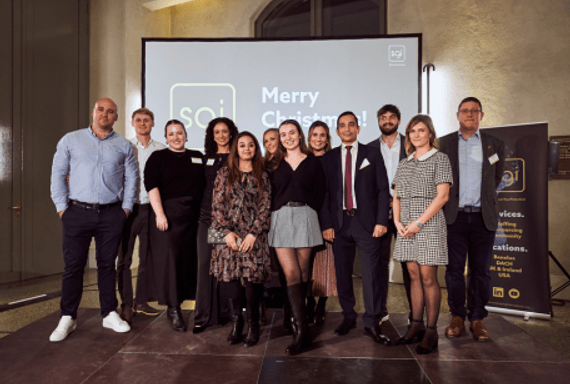In today’s digital era, it’s all about staying ahead in a rapidly evolving landscape. Keeping on top of the latest technology trends is vital for organisations striving to attract and retain top talent. But what can these advancements do for companies? In addition to enhancing processes, they provide essential tools that can completely redefine recruitment by streamlining operations and strengthening candidate experiences. Understanding these innovations can unlock significant advantages for hiring managers and tech professionals across industries, enabling better alignment between business objectives and recruitment strategies.
Key Technology Trends Shaping Talent Acquisition
Technology trends are one of the fastest-moving industries, so you must stay informed to stay on top and squash any competition. What are the current key technology trends? You guessed it- artificial intelligence (AI) is, of course, a front-runner. Companies should also look into data-driven recruitment and cloud-based recruitment solutions as they are reshaping traditional hiring practices. These advancements create a competitive edge by enabling faster, more accurate decision-making while enhancing recruiter productivity and allowing for more personalised candidate interactions. Let’s discuss these key trends in further detail.
Relevant Software Solutions:
-
Greenhouse ATS: A cloud-based applicant tracking system that integrates AI and reporting tools.
Cost: $6,000+/year (pricing varies by company size). -
Workday HCM: A comprehensive cloud platform for human capital management.
Cost: $99 per user/month. -
Eightfold.ai: AI-powered talent intelligence platform with advanced analytics.
Cost: Custom pricing (typically starts at $10,000/year).
AI and Automation in Talent Acquisition
Artificial intelligence is increasingly pivotal in talent acquisition, introducing powerful recruitment automation tools, applicant tracking systems (ATS), and predictive analytics. Looking into recruitment processes today, you’ll see that automation tools now handle many repetitive tasks such as resume screening, candidate sorting, and job-matching, significantly reducing the time-to-hire. Predictive analytics further empower recruiters by offering data-driven insights, allowing them to predict hiring needs, assess candidate fit, and identify potential skill gaps. With these tools, hiring managers are better equipped to make strategic hiring decisions, focusing on quality interactions and impactful hires.
A survey found that 76% of hiring managers believe that AI will play a significant role in their future recruitment efforts, particularly in large enterprises which handle high volumes of applications. By leveraging AI, businesses enhance recruitment efficiency and ensure their processes are scalable and adaptable to future needs. (1)
Further to this, ‘91% of business leaders expect their productivity to increase due to GenAI.’ This makes the decision for companies to implement this even easier! If you fail to adopt new technologies, you’ll be beaten by the competition. (2)
Relevant Software Solutions:
-
HireVue: AI-based video interviewing and assessment platform.
Cost: $35 per user/month. -
LinkedIn Talent Insights: Provides workforce and talent analytics to identify trends.
Cost: $2,000+/month. -
Phenom People: AI-powered recruitment marketing platform.
Cost: Starts at $1,500/month.
Enhancing Candidate Experience
Delivering a positive candidate experience is critical in a competitive job market. Technology now allows companies to streamline this journey through virtual hiring platforms, video interviewing software, and mobile-friendly recruitment solutions. This makes the job more accessible to candidates with mobile recruitment, making it easier to apply on the go and remote interviewing, which allows a broader group of people to apply and fit interviews into a busy schedule. (3)
Skills-based hiring, a growing trend, focuses on identifying candidates with relevant abilities over traditional qualifications, broadening the talent pool and supporting diversity and inclusion. Many tech companies have seen the benefits of skills-based assessments, which prioritise core competencies and problem-solving abilities. Companies adopting these tools and practices foster a fair, engaging recruitment process that resonates with today’s diverse and dynamic workforce.
Relevant Software Solutions:
-
Breezy HR: Mobile-friendly recruitment and video interview scheduling.
Cost: $143/month for small teams. -
Spark Hire: Video interviewing platform for recruiters.
Cost: $119/month for basic plans. -
Indeed Hiring Platform: End-to-end hiring solution with mobile optimization.
Cost: Pay-per-click/job post (varies by usage).
Onboarding and Continuous Feedback
Onboarding technology has advanced to provide personalised and seamless transitions for new hires. Platforms now offer interactive training modules, virtual mentorship, and progress-tracking tools, allowing companies to deliver a tailored onboarding experience that aligns with individual needs. Continuous feedback mechanisms are equally transformative, helping employees feel connected, engaged, and supported in their growth. A well-integrated feedback system contributes to higher retention rates and ensures that employees feel their contributions are valued, enhancing job satisfaction and long-term loyalty.
Companies that prioritise structured onboarding and feedback report up to 50% higher employee engagement rates. (4)
For hiring managers, adopting such practices underscores the organisation’s commitment to creating a nurturing work environment, which can be a significant attractor for prospective talent.
Relevant Software Solutions:
-
Bamboo HR: Onboarding automation and progress tracking.
Cost: $29 per user/month. -
Culture Amp: Continuous employee feedback and engagement platform.
Cost: $3,000/year for teams. -
Trello: Customizable project and onboarding management tool.
Cost: $12.50 per user/month.
Industry-Specific Recruitment Strategies
The nuances of each industry necessitate tailored recruitment strategies. Take a look at cybersecurity, for example, in which the roles demand expertise in navigating a talent market where demand often outstrips supply. Similarly, software development recruitment may require agility to quickly secure skilled professionals in a competitive field. Industry-specific recruitment strategies are critical to understanding the unique demands of each sector, allowing hiring teams to implement tactics that resonate with target talent pools.
Recruitment agencies specialising in tech roles, such as SGI, understand these industry intricacies and offer sector-specific expertise that streamlines the hiring process. With knowledge of trends and challenges unique to fields like financial services, engineering, and life sciences, recruitment teams can attract talent that aligns with an organisation’s strategic goals.
Relevant Software Solutions:
-
Dice Recruitment Packages: Tech-specific job board and talent sourcing platform.
Cost: $395+/month for single postings. -
Gem: Talent CRM and sourcing automation for niche tech roles.
Cost: Custom pricing, typically $10,000/year. -
SeekOut: AI-powered search for hard-to-find talent in specialized industries.
Cost: $12,000+/year.
Conclusion
Talent acquisition technology trends continue to drive transformation across industries, offering hiring managers and tech professionals the tools needed to remain competitive in an evolving market. By embracing AI and automation, focusing on candidate experience, improving onboarding practices, and adopting industry-specific strategies, organisations position themselves to attract high-calibre talent effectively. Staying ahead in talent acquisition software and technology gives you a competitive advantage and is essential for creating a thriving, adaptable workforce that drives long-term success.
If you're a recruitment consultant hoping to take your next defining career step, you can see our open positions here at SGI.







